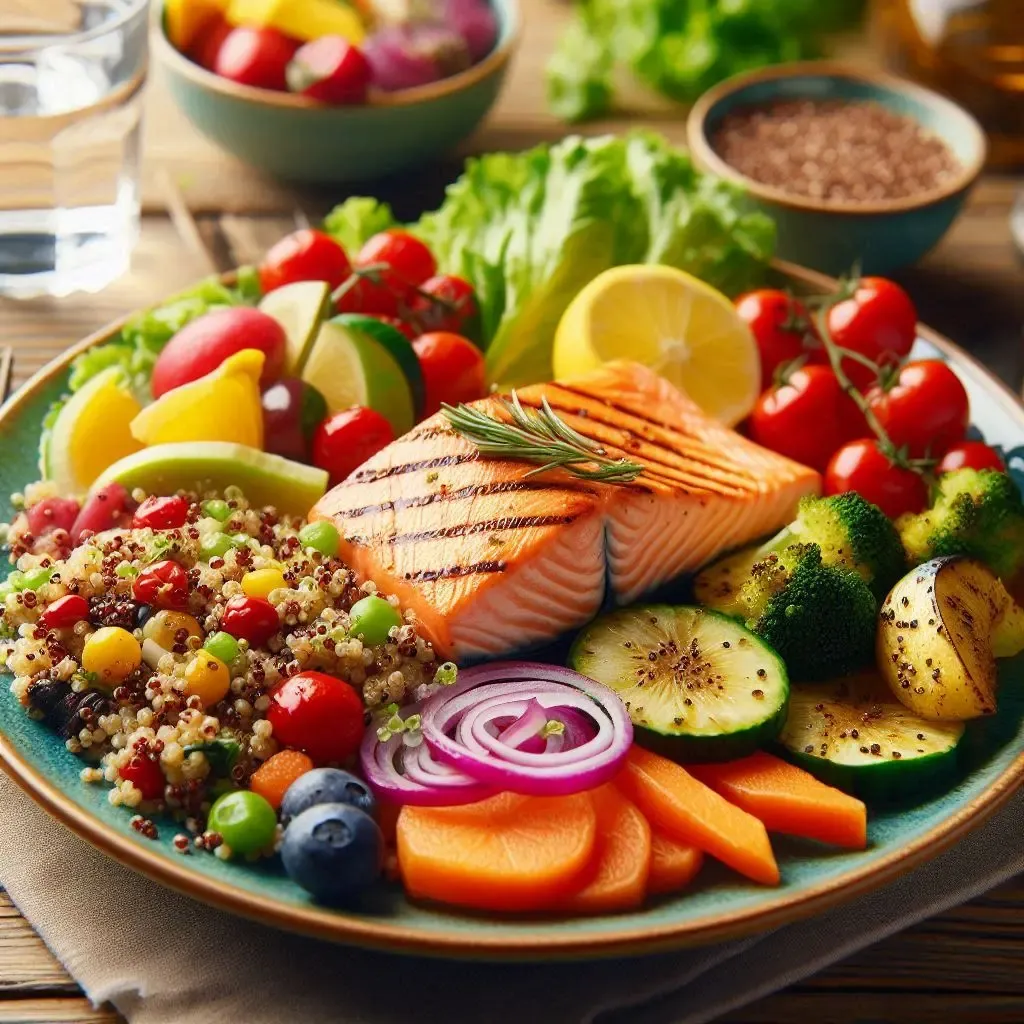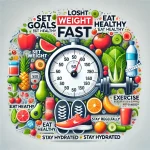- Top 10 Celsius Drink: The Ultimate 2025 Guide - 08/07/2025
- Prime Drink Comprehensive Deep Dive 2025 (10K+ word) - 08/05/2025
- Top Alani Energy Drink: 2025 Deep Dive(10K+ word) - 08/04/2025
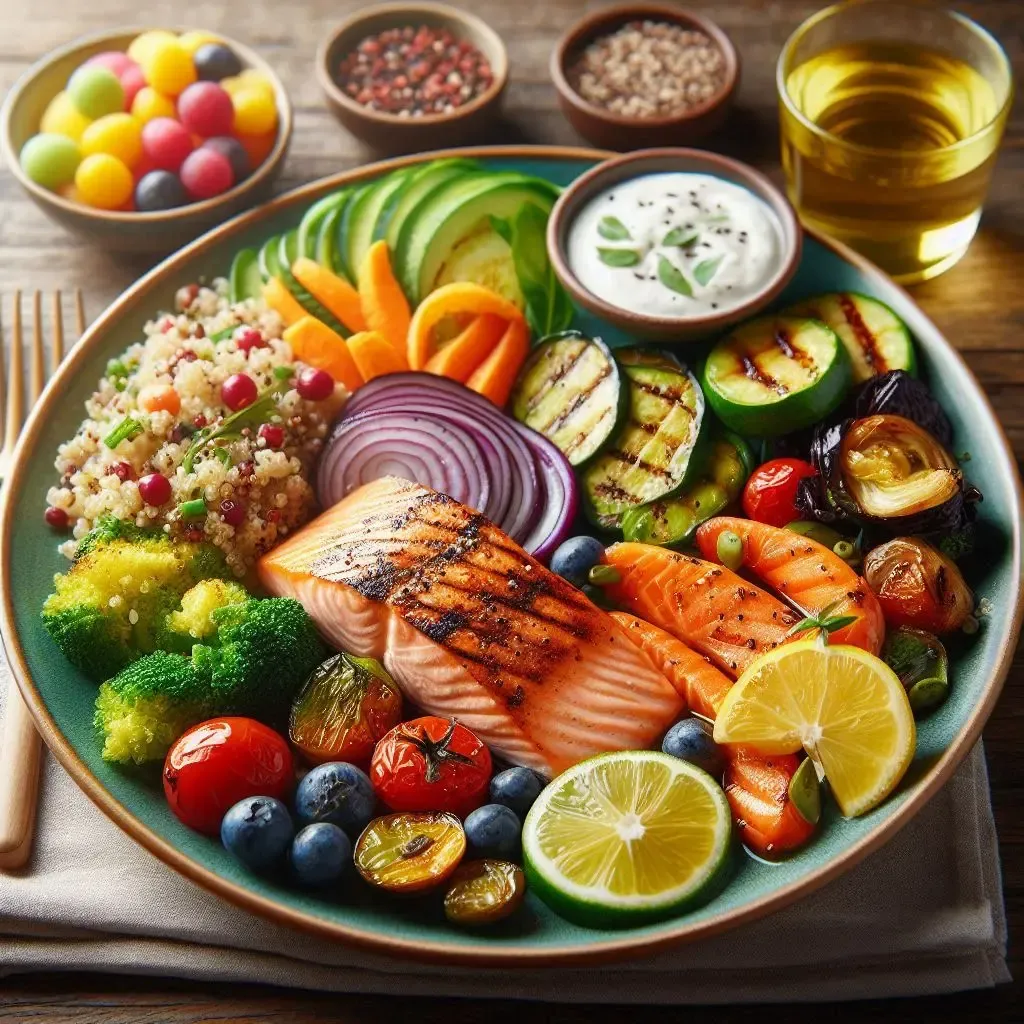
Table of Contents
Best Nutrition Meal Plan: A Comprehensive Guide
A well-balanced nutrition meal plan is essential for maintaining good health, boosting energy levels, and achieving specific fitness goals. It involves the right mix of macronutrients (proteins, carbohydrates, and fats) and micronutrients (vitamins and minerals) to meet your daily needs. Here’s a comprehensive guide to crafting the best nutrition meal plan for an average adult aiming for a healthy lifestyle.
1. Understanding the Basics
Before diving into the meal plan, it’s crucial to understand the fundamentals of a balanced diet:
- Macronutrients:
- Proteins: Essential for muscle repair, immune function, and hormone production. Aim for lean sources such as chicken, fish, beans, and tofu.
- Carbohydrates: The primary energy source. Opt for complex carbs like whole grains, fruits, and vegetables, which provide sustained energy and fiber.
- Fats: Vital for brain health, hormone production, and nutrient absorption. Focus on healthy fats like avocados, nuts, seeds, and olive oil.
- Micronutrients:
- Include a variety of fruits and vegetables to ensure adequate intake of vitamins and minerals, such as Vitamin C, D, iron, and calcium.
- Hydration:
- Drink at least 8-10 glasses (about 2 liters) of water per day. Proper hydration is essential for digestion, skin health, and overall body function.
2. The Ideal Meal Plan
This meal plan is designed for an adult with moderate activity levels (e.g., light exercise a few times a week) and a daily caloric intake of around 2,000-2,500 calories. Adjust portions and ingredients based on your specific caloric needs, activity level, and health goals.
Breakfast: 7:00 – 8:00 AM
- Oatmeal with Berries and Nuts
- 1/2 cup of rolled oats cooked in water or low-fat milk
- A handful of mixed berries (e.g., blueberries, strawberries)
- 1 tablespoon of chia seeds or flaxseeds
- A sprinkle of nuts (e.g., almonds, walnuts)
- Beverage: Green tea or black coffee (without added sugar)
This meal provides a balance of complex carbohydrates, fiber, and healthy fats, keeping you full and energized throughout the morning.
Mid-Morning Snack: 10:00 – 11:00 AM
- Greek Yogurt with Honey and Banana
- 1 cup of plain Greek yogurt
- 1 teaspoon of honey
- 1 small banana, sliced
This snack is rich in protein and probiotics, promoting digestive health and providing sustained energy.
Lunch: 12:30 – 1:30 PM
- Grilled Chicken Salad
- 100-150 grams of grilled chicken breast
- Mixed greens (e.g., spinach, kale, arugula)
- Colorful veggies (e.g., tomatoes, cucumbers, bell peppers)
- 1/4 cup of quinoa or brown rice
- Dressing: Olive oil, lemon juice, salt, and pepper
This lunch is a powerhouse of lean protein, healthy fats, and complex carbs, providing sustained energy and keeping you full until the next meal.
Afternoon Snack: 3:30 – 4:30 PM
- Apple Slices with Almond Butter
- 1 medium apple, sliced
- 1-2 tablespoons of almond butter
This combination offers fiber, healthy fats, and a touch of sweetness to curb mid-afternoon hunger.
Dinner: 6:30 – 7:30 PM
- Baked Salmon with Steamed Vegetables
- 150 grams of baked salmon (seasoned with herbs and lemon)
- Steamed vegetables (e.g., broccoli, carrots, asparagus)
- 1/2 cup of quinoa or sweet potato
Dinner should be light yet nutrient-dense, providing protein and essential omega-3 fatty acids from salmon, which are beneficial for heart health.
Evening Snack: 8:30 – 9:00 PM
- A Handful of Mixed Nuts or a Piece of Dark Chocolate (70% cocoa or higher)
This light snack satisfies sweet cravings while providing healthy fats and antioxidants.
3. Tips for Success
- Meal Prep: Plan and prepare your meals in advance to save time and avoid unhealthy choices.
- Portion Control: Be mindful of portion sizes to maintain a healthy weight.
- Variety: Include different foods to prevent nutrient deficiencies and keep meals interesting.
- Limit Processed Foods: Focus on whole, natural foods and minimize processed foods high in added sugars, salt, and unhealthy fats.
- Listen to Your Body: Adjust the meal plan based on your hunger levels, energy needs, and overall health goals.
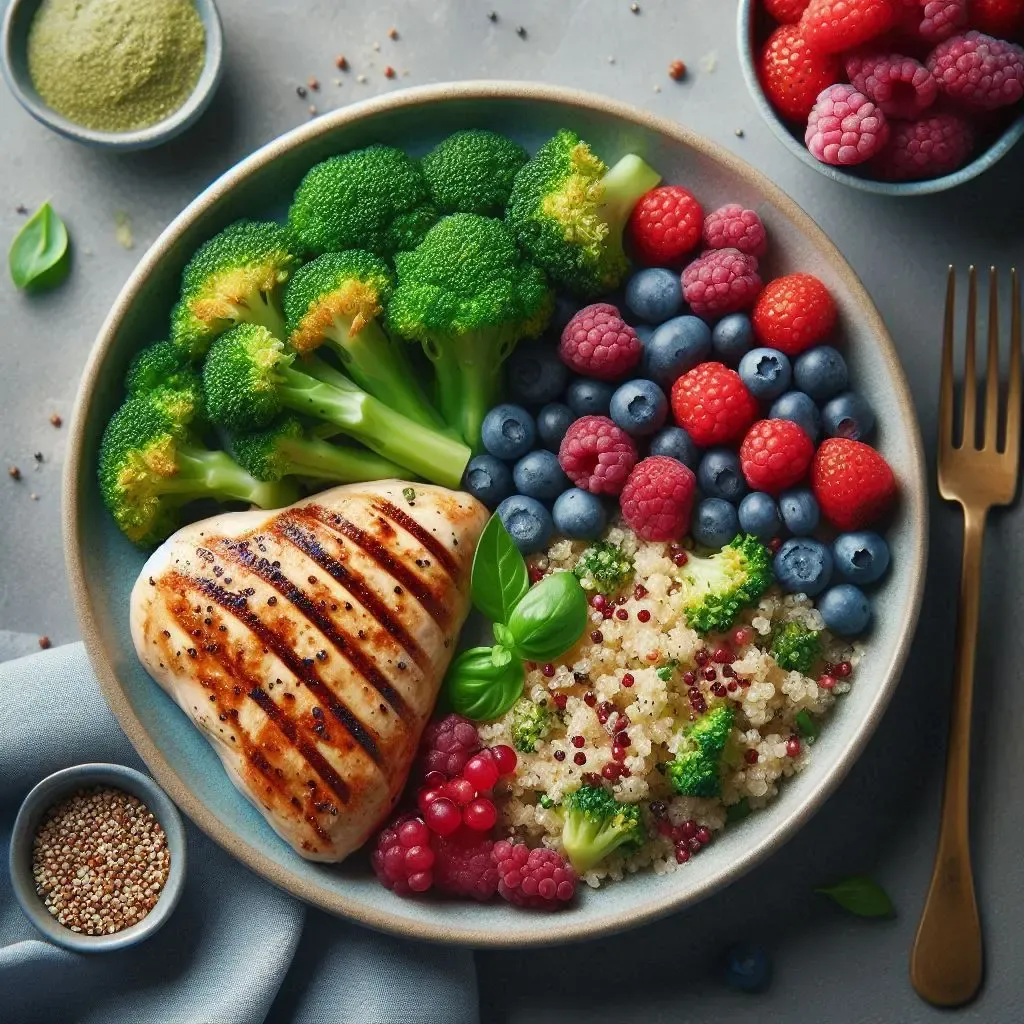
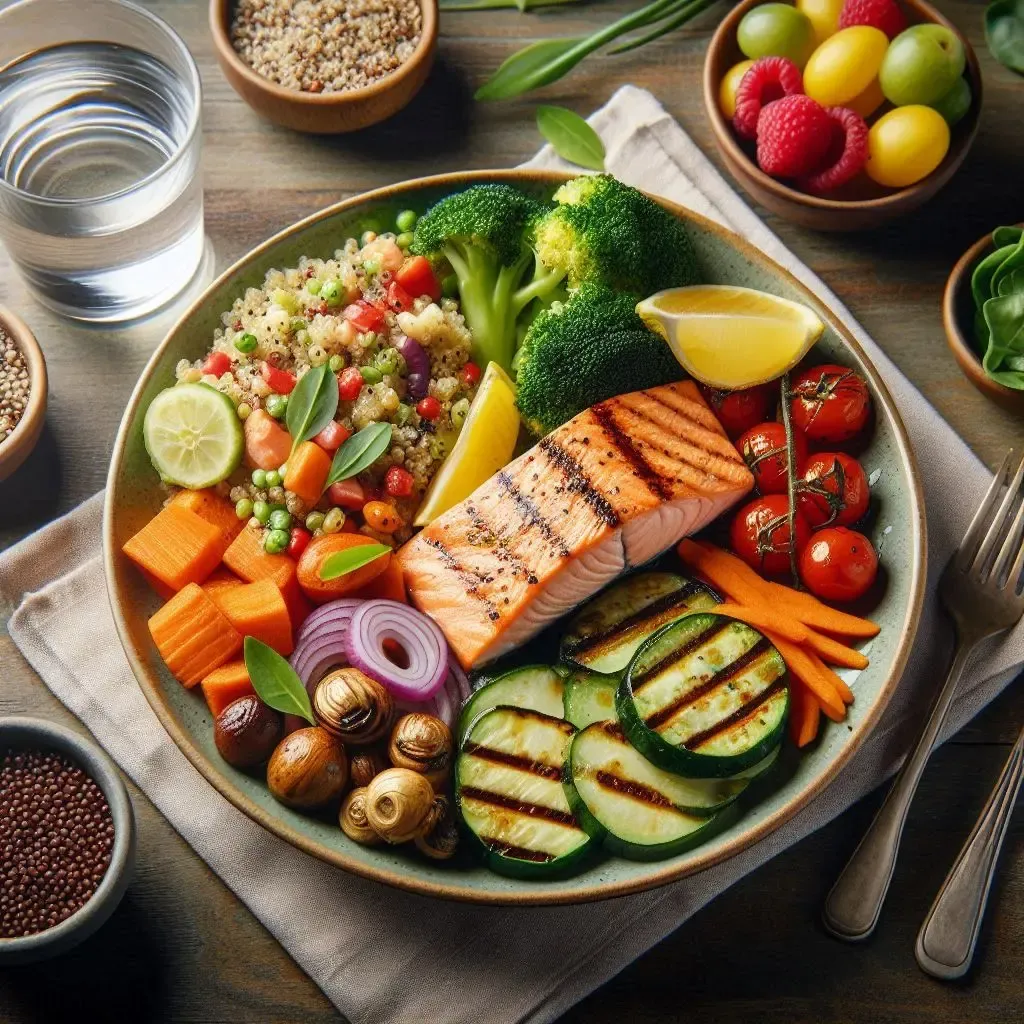
4. Conclusion
A balanced meal plan that includes a variety of nutrient-dense foods is key to maintaining good health, energy, and well-being. This sample plan offers a guideline, but personal needs may vary. Always consult with a healthcare provider or nutritionist to tailor your diet to your specific health goals and requirements. Remember, healthy eating is a lifestyle, not a temporary change.
How to Improve Your Sleep(8 Steps) – love a happy home (loveahh.com)
- Always Discreet Adult Incontinence Underwear 2025
- Amazon Best Sellers in Health Household: Top 10 2025
- Little Yellow Duck Lunch Bag: Perfect Combination 2025
- How Men Show Love 2025 In-Depth Guide
- How to Increase Charisma: Women’s Edition 2025
- How to Increase Charisma: Men’s Edition 2025
- American Muscle Women on Social Media 2024 Top 10
- American Muscle Men on Social Media 2024 Top 10
- American Muscle Women: Top 10
- American Muscle Men: Top 10
- Traditional Chinese Medicine: Ancient Healing
- Best Nutrition Meal Plan: A 12 hours Guide
- Best Nutrition Meal Plan: A 7-Day Guide
- How to Lose Face Fat(1 Perfect Guide)
- How to Lose Weight Fast(10 Steps Perfect Choice)
Amazon Best Sellers in Health & Household: Top 10 Must-Have Products for Every Household
We all want a cleaner, healthier home - but who has time to sort through Amazon's endless options? The good news: millions of shoppers have already done the work for you by voting with their wallets.
These Health & Household bestsellers aren't just popular - they're the real MVPs that:
• Make everyday tasks easier
• Deliver quality without the crazy price tag
• Earn rave reviews again and again
From bathroom upgrades to cleaning must-haves, here are the 10 products worth adding to your cart today:
1. Bounty Quick Size Paper Towels, White, 8 Family Rolls = 20 Regular Rolls (Packaging May Vary)
Product Overview: When it comes to cleaning up spills and messes, few brands are as trusted as Bounty. Known for their durability and absorbency, Bounty Quick Size Paper Towels offer high-quality performance with the convenience of quick and easy cleanup. With this pack of 8 Family Rolls, you get the equivalent of 20 regular rolls, making it a cost-effective solution for your home.
Key Features:
- Extra-absorbent for faster cleanup.
- Quick Size sheets to help reduce waste.
- Ideal for both small and large messes.
- Soft yet durable for everyday use.
Customer Benefits: Bounty’s Quick Size Paper Towels are designed to tackle even the toughest spills. Whether you're cleaning up water, grease, or food messes, these towels can handle it all. Plus, the compact roll size is perfect for storing in tight spaces, and the generous pack size ensures you won’t run out too soon.
2. Amazon Basics 2-Ply Toilet Paper, 30 Rolls = 120 Regular Rolls, 350 Sheets, Unscented
Product Overview: Looking for a reliable toilet paper option that combines both comfort and value? Amazon Basics offers a 2-ply toilet paper that’s perfect for households of all sizes. With 30 rolls in this pack, you’re getting the equivalent of 120 regular rolls, each containing 350 sheets. Plus, the unscented version ensures it’s suitable for sensitive skin.
Key Features:
- 2-ply sheets for softness and strength.
- 350 sheets per roll for extended use.
- Unscented and hypoallergenic for sensitive skin.
- High absorbency to minimize usage.
Customer Benefits: This toilet paper delivers superior quality without the high price tag. The soft, yet durable sheets make it ideal for everyday use, and the large pack size means you’ll be stocked up for a while, saving you the hassle of frequent reordering.
3. LMNT Zero Sugar Electrolytes - Variety Pack | Drink Mix | 12-Count
Product Overview: For those looking to stay hydrated and replenish lost electrolytes, LMNT Zero Sugar Electrolytes are an excellent choice. This variety pack offers 12 individual servings of drink mix, providing a refreshing and healthy alternative to sugary sports drinks. Each serving is packed with electrolytes and contains zero sugar, making it a great option for fitness enthusiasts and health-conscious individuals.
Key Features:
- Zero sugar and no artificial ingredients.
- Packed with electrolytes to maintain hydration.
- Available in a variety pack with different flavors.
- Suitable for all ages, including athletes.
Customer Benefits: LMNT Electrolytes help you stay hydrated and maintain optimal body function, whether you're hitting the gym or just staying active throughout the day. The convenient packets make it easy to take on the go, and the variety of flavors ensures there's something for everyone.
4. Charmin Ultra Soft Cushiony Touch Toilet Paper, 24 Family Mega Rolls = 123 Regular Rolls
Product Overview: Charmin Ultra Soft Toilet Paper is known for its incredible softness and comfort. With 24 Family Mega Rolls that equate to 123 regular rolls, this toilet paper provides excellent value. The ultra-soft texture ensures a luxurious experience every time you use it, making it perfect for those who prioritize comfort.
Key Features:
- Ultra-soft for maximum comfort.
- Mega rolls last longer than standard rolls.
- 2-ply for strength and durability.
- Ideal for large households or frequent use.
Customer Benefits: Charmin Ultra Soft Toilet Paper is perfect for those who want a high-quality, soft experience without compromising on strength. The long-lasting mega rolls reduce the frequency of replenishing your supply, saving you time and effort in the long run.
5. Scott ComfortPlus Toilet Paper, 12 Double Rolls, 231 Sheets per Roll, Septic-Safe, 1-Ply Toilet Tissue
Product Overview: Scott ComfortPlus Toilet Paper offers an affordable and reliable option for everyday use. With 12 double rolls, each containing 231 sheets, this toilet paper provides excellent value while maintaining strength and softness. It’s septic-safe, making it a great choice for homes with septic systems.
Key Features:
- 1-ply design for efficiency and strength.
- Septic-safe for homes with septic systems.
- 231 sheets per roll for more use.
- Affordable and budget-friendly.
Customer Benefits: Scott ComfortPlus Toilet Paper is perfect for those who need a reliable, affordable toilet paper that performs well and doesn’t clog septic systems. It’s a great choice for families or those with a high household demand.
6. Hefty Ultra Strong Tall Kitchen Trash Bags, Lavender & Sweet Vanilla Scent, 13 Gallon, 80 Count
Product Overview: Hefty Ultra Strong Tall Kitchen Trash Bags provide extra strength for your kitchen cleanup needs. These 13-gallon bags are ideal for large households or those who generate significant waste. The lavender and sweet vanilla scent ensures that your kitchen stays smelling fresh while these bags handle even the heaviest loads.
Key Features:
- Ultra-strong to handle heavy loads without breaking.
- 13-gallon size fits most kitchen bins.
- Scented with lavender and sweet vanilla for freshness.
- 80-count package for long-term use.
Customer Benefits: These trash bags are designed to make your kitchen clean-up quick and easy. The scented bags help mask odors, and their durability ensures they won’t tear or break under pressure. With 80 bags in a pack, they’re a great value for any home.
7. Sparkle Pick-A-Size Paper Towels, 6 Double Rolls = 12 Regular Rolls, Everyday Value Paper Towel With Full And Half Sheets
Product Overview: Sparkle Pick-A-Size Paper Towels are perfect for households looking for versatile, durable, and affordable paper towels. With the ability to choose between full or half sheets, these towels give you flexibility when it comes to cleaning up messes of any size. This 6 double-roll pack is equivalent to 12 regular rolls, providing great value.
Key Features:
- Pick-A-Size design to save on waste.
- Strong and absorbent for everyday messes.
- Available in a value pack of 6 double rolls.
- Soft enough for most cleaning tasks.
Customer Benefits: Sparkle’s Pick-A-Size Paper Towels are a great choice for anyone who wants to minimize waste while maximizing the cleaning power. The absorbent material is perfect for cleaning up both small and large messes around the house.
8. Miss Mouth's Messy Eater Stain Treater Spray - 4oz Stain Remover
Product Overview: Miss Mouth's Messy Eater Stain Treater Spray is a must-have for parents of young children or anyone who deals with frequent stains. This 4oz spray is specifically designed to remove food, grease, and coffee stains from fabrics without requiring dry cleaning. It’s perfect for treating stubborn stains on clothes, upholstery, and even undergarments.
Key Features:
- Removes food, grease, coffee, and other tough stains.
- Safe for use on a variety of fabrics.
- Non-toxic and environmentally friendly.
- Ideal for busy parents and families.
Customer Benefits: This stain treater is a lifesaver for busy families or anyone who is constantly dealing with food or beverage stains. It works quickly and effectively, helping to restore fabrics without any harsh chemicals or complicated processes.
9. Physician's Choice Probiotics 60 Billion CFU - 10 Strains + Organic Prebiotics - Immune, Digestive & Gut Health
Product Overview: Physician's Choice Probiotics is a premium product designed to support gut health, digestion, and overall immunity. With 60 billion CFU per capsule and 10 probiotic strains, it’s an effective supplement for anyone looking to improve their digestive health and strengthen their immune system.
Key Features:
- 60 billion CFU per serving for maximum potency.
- Includes 10 probiotic strains and organic prebiotics.
- Supports digestive health, immunity, and gut balance.
- Ideal for both men and women.
Customer Benefits: Physician's Choice Probiotics is a great addition to any health regimen, particularly for those dealing with digestive issues. It helps maintain a healthy gut microbiome, improve digestion, and support overall well-being.
10. Cottonelle Fresh Feel Flushable Wet Wipes, Adult Wet Wipes, 8 Flip-Top Packs, 42 Wipes Per Pack
Product Overview: For added freshness and hygiene, Cottonelle Fresh Feel Flushable Wet Wipes are a great companion to regular toilet paper. These wipes are designed for adults and come in a convenient 8-pack with 42 wipes per pack, ensuring you always have access to a clean, refreshing experience.
Key Features:
- Flushable and septic-safe for easy disposal.
- Soft and gentle on skin.
- Ideal for use after toilet paper for a fresher clean.
- 8-pack for long-lasting supply.
Customer Benefits: These wet wipes add an extra layer of freshness after using the restroom, making them perfect for anyone who wants to feel cleaner and more refreshed. The flushable design ensures easy disposal, while the soft material is gentle on the skin.
Let's be real - these bestsellers became popular for good reason. We're talking:
• Everyday essentials that actually work (no more flimsy paper towels!)
• Health boosters your body will thank you for
• All the little things that make home life smoother
Add a few to your next order and feel the difference - your future self will appreciate the upgrade.
🎯 Don’t Miss Out — These Are Reader-Favorite Bestsellers You’ll Love Too 👇
| # | 🎁 Product | 💬 Why It Converts | 🔗 Quick Action |
|---|---|---|---|
| ✅ 1 | Exploding KittensThe Wildly Popular Card Game | 🔥 100,000+ rave reviews🤣 Fun for all ages🎉 #1 party game choice | 👉 Click to Check Price |
| 😂 2 | Funny Dad T-Shirt“You Can’t Scare Me, I Have Kids” | 👕 Viral dad gift🎂 Perfect for birthdays & Father’s Day💬 Gets people laughing instantly | 👉 See It in Action |
| 🕯️ 3 | Luxury Candle Gift SetElegant 1-Wick, Spa Fragrance | 🧘♀️ Instant relaxation🎁 Beautifully boxed for gifting💡 Affordable luxury | 👉 Treat Yourself or Gift Now |
| 🔍 4 | Tile Bluetooth TrackerFind Anything in Seconds | 🛠️ Life-saving tech🧓 Great for parents, teens, travelers📱 Works with your phone | 👉 Never Lose Anything Again |
| 📘 5 | Atomic Habits by James ClearTransform Your Daily Life | 📖 20M+ readers worldwide🔑 Simple steps, big results🎓 Top self-growth book | 👉 Read What Everyone’s Talking About |
✅ Why These Items Sell:
| 💡 Trigger | Example in Table | How It Helps Conversion |
|---|---|---|
| ✅ Social Proof | “100,000+ rave reviews” | Builds trust instantly |
| 🎯 Use Case Clarity | “Great for family game night” | Reduces decision friction |
| 🚀 Action Verbs | “Click to check price” | Encourages immediate action |
| 🔥 Urgency & Emotion | “Don’t miss out” / “Treat yourself” | Triggers impulse buying |
| 🎁 Gifting Potential | “Perfect for birthdays & holidays” | Taps into universal purchase intent |
❤️ Your Click Makes a Difference
Every purchase made through these links helps support this site and keeps great content coming — Thanks!
💬 Why Tip? It’s Not Just Money — It’s Motivation ❤️
| 😊 What You Got | 🎁 What I Get | 🔗 What You Can Do |
|---|---|---|
| ✔️ A smile or laugh | ✔️ A reason to keep creating | 👉 Buy me a coffee ☕️ |
| ✔️ Useful tips, insights, or ideas | ✔️ Proof that this content helps | 👉 Click the support button 💸 |
| ✔️ Fun, relatable content | ✔️ Motivation to go deeper & better | 👉 Leave a tip + kind feedback 🙌 |
| ✔️ Ad-free reading experience | ✔️ A little financial breathing room | 👉 $1 isn’t too little, $10 isn’t too much 🎉 |
| ✔️ A sense of connection | ✔️ The joy of being seen and supported | 👉 Let me know you’re out there 👀 |
❤️ If you made it this far, maybe that’s your sign to support? Every tip matters!

